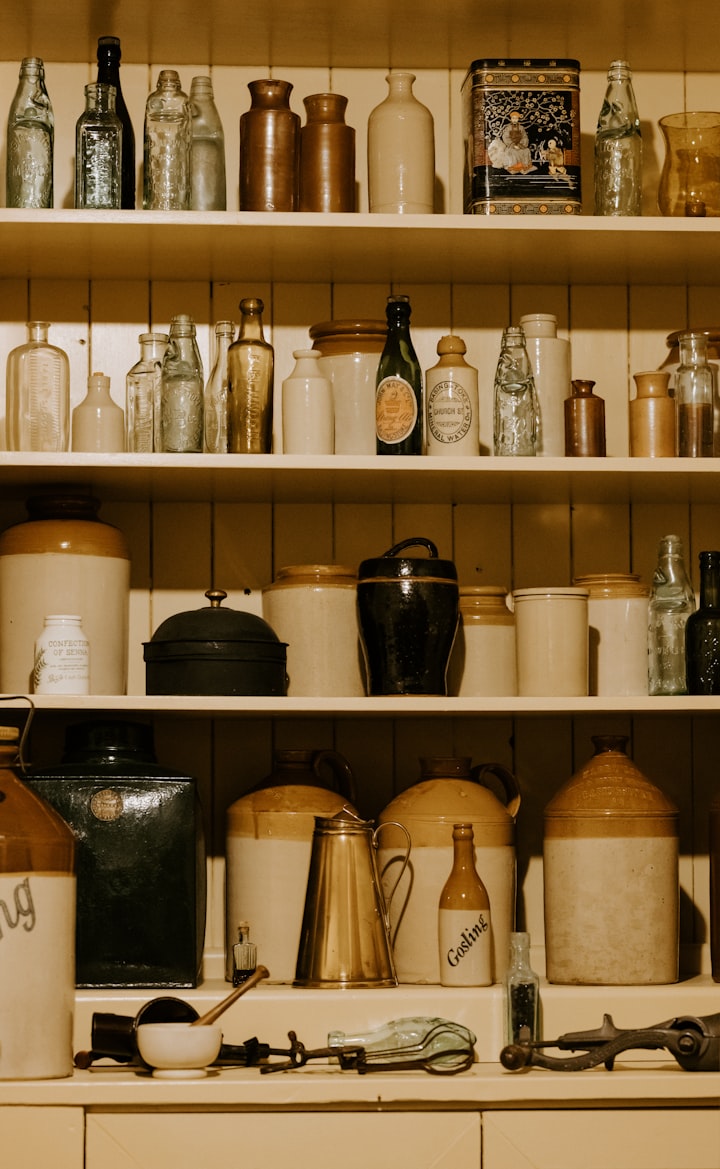Curious
What can come of snooping where you don't belong

Anna Williams grew up in a wealthy family. She had everything she could ever ask for; she was raised by a nanny, taught by the finest tutors her father could buy, dressed in ribbons and lace. If she ever left the manor, it was to attend parties at the homes of her parent’s friends, and she was often left at home for such events in any case. Anna felt trapped in her home, in the routines and familiarity. To entertain herself, she explored her home and the surrounding gardens. She wanted to see every room in the house, look in every closet, open every drawer. She even looked inside all of the little boxes and bottles that were sitting on vanities and tables. She was frequently disappointed to find them empty, but was always delighted to find various accessories and makeups in the vanities, or pens and stamps in the writing desks.
Boxes were always more interesting when something was inside them, but the most exciting times were when the box contained something completely surprising. Anna’s favorite surprises had included fancy imported chocolates from a box by her mother’s chair in the parlor, a velvet bag of assorted coins tucked away in one of the servant’s quarters, and a gorgeous necklace with diamonds and emeralds hanging from a gold chain, resting on a velvet pillow, found in an unassuming brown paper box and tied with a string.
Of course, sometimes, she found things that were considerably unpleasant. In the attic, she found a box full of photographs of young children who appeared to be asleep. Even at that age, however, Anna knew that the photographed children were her aunts, uncles, and cousins who had passed away, and were photographed to preserved their memory. Anna had dropped the photographs in a frightened surprise when she realized what she was looking at, but in the end, she was more intrigued than afraid.
The family and the staff all new of Anna’s propensity for snooping, but left her to it, considering it harmless. She was occasionally caught in rooms she shouldn’t be in, or peeking around the corner to see what packages had come to the kitchen, but Anna was efficient at leaving everything she explored exactly as she found it. She never took anything that didn’t belong to her (there was no need, everything she desired was provided for her, and it wasn’t the purpose of the game, anyway). She could also unwrap paper packages and close them without tearing them, and she could small locks on jewelry boxes and lock them again.
Doors were another obstacle. Almost every door in the house had a lock, and almost all of the locks were able to be opened by the skeleton key, which was kept by the butler, but a spare key hung from a hook near the kitchen. If no one was around, Anna could reach the key by standing on a stool.
Too Anna’s frustration, there were four doors on the property that the key could not open. The large, clunky locks couldn’t be opened with the hairpins she used to open desk drawers and jewelry boxes. One of these doors, she knew, lead to her father’s office. Unlike his study, where he sometimes conducted business and met with associates, his office was a private space where he was not to be disturbed, even by the servants. Because meals and meetings were always kept prompt in the household, this was rarely a concern, although the servants did become anxious if he was late to emerge, knowing that they would be reprimanded for disturbing him and also reprimanded for failing to inform him of his next scheduled event.
Another door she could not open belonged to her grandmother. It was not her bedroom, or her sewing room, or the sitting room where she spent most of her time. The door was in the parlor, it was small and covered with the wallpaper to hide it, and may have appeared to be a closet or a servant’s entrance to anyone without so curious a mind as Anna’s. Anna had looked through the keyhole and gone outside to find the windows to the room to see as much as she could of it, and from what she could gather, it was a very small, ill-lit room with a single chair, an ottoman, and a side table.
There was also a door in the servant’s quarters that Anna could not unlock. It was in the floor, leading to a cellar, perhaps, but she had been to the wine cellar and a separate fruit cellar and not been able to find the other side of the door. The wine and fruit cellars were not large enough to cover the area of the house beneath the kitchen and servant’s quarters. She wanted to ask about it, but she wasn’t supposed to go into the servant’s quarters, and she didn’t want to get in trouble.
The final lock was outside, at the far southwest corner of the garden. It was an ivy-covered shed that the gardeners used to store their tools. Anna tried to tell herself that there was nothing interesting in there, but she was still curious. She pushed aside the ivy to look in the windows, but wasn’t able to see much, and she didn’t like to hang around there for too long because the head gardener was an angry man who would scream at her and chase her away so she wouldn’t cause mischief.
Over the years, Anna had explored everywhere she could multiple times. There were occasionally surprises, a new box or a moved piece of furniture, but she was coming to a point where she had memorized every inch of the property. She wanted more than anything to see beyond the doors she hadn’t been able to already, and she started trying to find ways to do that. She tried a few times to pick the locks on her grandmother’s room, and the floor hatch, but didn’t have enough time to work the locks before she was caught.
The garden shed was much more secluded, as long as the gardeners were out working and her governess wasn’t looking for her. She was able to collect a few larger lock picking tools and spent a few days tinkering with it. Finally, she was successful. The clunk of metal as she pulled the lock open was thrilling, and she gasped with a disbelieving smile.
She knew she had to be quick, but she found that she had been correct in her assumption that the shed offered little to discover. Still, she drank it all in eagerly, from the strange mechanisms she didn’t know how to use, to the discarded tools that were too damaged to use. She tried to imagine each item as it had been invented, created, purchased, and fulfilled its purpose before being stored away and in some cases, hidden in shadows under thick layers of dust, forgotten.
There were even a few personal effects of the gardeners; mostly bottles and jugs that had once contained spirits. There was a pad of paper with a pencil and a few rough sketches of various garden layouts, and she imagined one of the gardeners had the eye of an artist and would prefer to spend his time designing symmetrical and beautifully arranged courtyards for the highest of nobility instead of trimming the hedges in her father’s relatively simple yard. She thought she might discover which of the three men this belonged to, someday, and see if he could bring to reality what he created on paper.
The greatest thing, however, she nearly missed. She had climbed a small ladder and was looking through a shelf full of various objects when she saw, in the back corner, something that clearly had been placed there recently. It was a brown paper box tied with a string, and Anna couldn’t wait to open it. Of course, she took her time, unfolding it carefully to not create any new creases so she could put it away again and no one would be able to tell it had been disturbed.
Curiously, the item inside was something she had seen before. It was a necklace, the necklace, a gold chain with diamonds and emeralds. She’d last seen it in the small room of one of the housemaids, and assumed it was a family heirloom (or perhaps something stolen, she thought, but it was none of her business). Knowing no better, she replaced the necklace and the box as she’d found it, exited the shed, and locked it behind her.
Days later, there was an unusual commotion amongst the staff, such a fuss that her mother and eventually even her father became involved. Her mother’s housekeeper was distraught, crying and wailing and completing none of her daily tasks. Anna knew this was unusual because she listened to the gossip among the maids frequently and they never shirked their duties regardless of their distress. Her governess tried to keep her away from the situation, but Anna was concerned that perhaps there had been a death or another terrible news.
She sat in the parlor, scheming of a way to discover what had happened, when she was approached by her mother and the housekeeper themselves, to Anna’s surprise.
“Anna, dear,” her mother said, kneeling in front of her and using a terribly sweet tone that was only used when Anna was in trouble. “You know this house better than anyone, don’t you?”
Anna was careful with her words, not yet knowing what she was being reprimanded for. “Yes, I suppose,” she admitted.
“Have you ever seen an emerald necklace on a gold chain somewhere in the house?” her mother asked seriously.
“It was in a paper box, easily missed and nothing to remember,” the housekeeper added, at first with hope and then despondent.
“Yes, I’ve seen it in two places,” Anna said. She didn’t think she was in trouble any more, and wanted to help them find it.
Both women looked at her with wide, hopeful eyes. “Where? Where did you see it?” her mother demanded.
“It was in the servant’s quarter’s; I don’t know who’s room. A few days ago, I found it again in the garden shed.”
“Where?” she demanded again. “Can you show me where?”
Anna took them out to the shed. Her father followed, and forced the gardeners to unlock it for her so she didn’t have to pick the lock again. The box was right where she’d left it, and still had the necklace safely tucked inside.
Her mother and the housekeep her hugged tightly, sobbing in relief. The angry gardener that Anna didn’t like was arrested and confessed to stealing the necklace. Anna was confused about the occurrence for many years.
It wasn’t until her wedding day that she discovered the truth. The necklace was gifted to her by her mother, and the story explained. It was passed down through generations, mother to daughter. It’s purpose was to be pawned and the money used to escape a bad marriage, if need be. Her mother had given it to the housekeeper to keep it hidden from her father, just in case, but it had been discovered and stolen by the gardener. Anna didn’t know if she would ever need it, or if her daughter or granddaughter would, but she was glad she had been at the right place at the right time to keep it in the family.
About the Creator
Tristin Roholt
I've wanted to be a writer since I was in first grade. I like to write fantasy and fairytales!






Comments
There are no comments for this story
Be the first to respond and start the conversation.